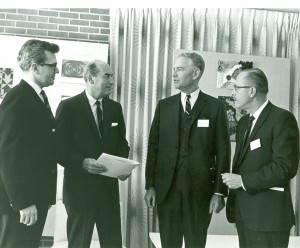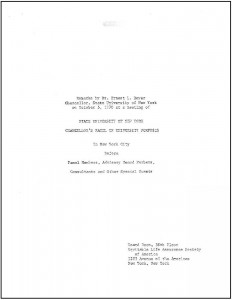
Ernest L. Boyer, as vice chancellor of the State University of New York, with SUNY chancellor Samuel B. Gould and two other men in 1968.
From his humble beginnings in Dayton, Ohio, Ernie Boyer became a major leader in American higher education. After earning his PhD at the University of Southern California Santa Barbara, in 1955, Boyer held positions with the Western Colleges Association and the Center for Coordinated Education at USC Santa Barbara before, at the tender age of thirty-six, receiving an invitation from the State University of New York (SUNY) system to serve as vice chancellor for university-wide programs in 1965. Three years later, he was appointed vice chancellor of the entire SUNY system, a post he held until his 1971 inauguration as SUNY chancellor.
For an educator like Ernie Boyer, the mid-1960s were — to borrow a turn of phrase from the English novelist Charles Dickens — both “the best of times and the worst of times.” The post-World War II G. I. Bill made higher education more accessible than ever before for millions of American men and women; as a result, universities and colleges were flush with cash and ambitiously pioneering new educational programs, initiatives, and scholarly ventures. But the postwar boom was also a blessing in disguise; as colleges and universities rapidly expanded both their curricular and co-curricular programming, they also expanded their campuses and physical plants — in ways that sometimes put them in conflict with their neighbors. At the same time, the 1960s were a time of great social unrest, especially among college and university students, which sometimes meant conflict and tension with educators and administrators.
It was into this complex situation that Boyer stepped when he joined the SUNY administration. But he brought with him a set of convictions well suited to navigating such complexities, especially an educational commitment to the common good.

The cover page of Ernest L. Boyer’s remarks to a meeting of the Chancellor’s Panel on University Purposes on October 5, 1970.
That commitment was on full display in October 1970, when Boyer and recently resigned SUNY Chancellor Stephen Gould convened a Chancellor’s Panel on University Purposes in New York City. The gathering was designed to bring together educational, civic, and business leaders for a conversation about how universities might take stock of their society and of themselves, and create bold and flexible new procedures, combinations, and structures that would serve both their needs and the needs of the surrounding community.
According to Boyer’s introduction to the meeting, the Chancellor’s Panel began with the intention to be on top of societal and structural changes and to help close the gap between the university and its community, since it appeared that those two entities sometimes seemed to be eyeing each other fearfully across a widening chasm of suspicion and distrust. Boyer explained that this distrust stemmed from the university being asked to face higher enrollments and meet endless demands for service, while at the same time struggling with inadequate facilities, spiraling costs, and mounting criticism and angry assaults from all sides.
According to Boyer, the Panel was needed to address the tension. Boyer urged his fellow panelists as well as the university as a whole to focus their attention on two crucial issues: the clarification of the mission of the university, and the growing tension between schools and the communities they serve. He advised the university to listen to its community, and to try to understand the social context in which it operated.
Most importantly, he argued that the university’s goals cannot be realized outside of a commitment to the flourishing of the communities it serves — that is, outside of a commitment to the common good. “No university can prosper, no university can even survive, unless it serves its society well and, in turn, wins society’s confidence and support,” Boyer wrote.
Boyer continued to articulate this kind of educational commitment to the common good throughout his years as SUNY chancellor, from 1971 to 1976.
